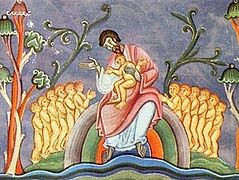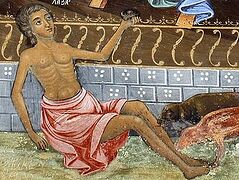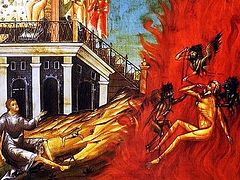In the name of the Father, the Son, and the Holy Spirit.
Today the Holy Church reminds us as it does again and again of the parable of the rich man and Lazarus. We remember it. This parable is too important, just as everything is in Holy Scripture, and that is why we read and reread it every day, and think about it. The Lord Jesus Christ tells this parable to the ordinary folk gathered around Him in order to make each of them understand with their minds and souls: There was a certain rich man, which was clothed in purple and fine linen, and fared sumptuously every day: And there was a certain beggar named Lazarus, which was laid at his gate, full of sores, And desiring to be fed with the crumbs which fell from the rich man’s table: moreover the dogs came and licked his sores (Lk. 16:19–21). This is a well-known story that has continued on from decade to decade, century to century. There are insensitive people, and there are humble and meek, people right next door, who endure their suffering. And it came to pass, that the beggar died, and was carried by the angels into Abraham’s bosom: the rich man also died, and was buried; And in hell he lift up his eyes, being in torments, and seeth Abraham afar off, and Lazarus in his bosom. And he cried and said, Father Abraham, have mercy on me, and send Lazarus, that he may dip the tip of his finger in water, and cool my tongue; for I am tormented in this flame. But Abraham said, Son, remember that thou in thy lifetime receivedst thy good things, and likewise Lazarus evil things: but now he is comforted, and thou art tormented. And beside all this, between us and you there is a great gulf fixed: so that they which would pass from hence to you cannot; neither can they pass to us, that would come from thence (Lk. 16:22–26).
From generation to generation, through images and parables the Church tells people about the great truth that each of us must experience, whether we believe or not, whether we like it or not, whether we want it or not. But man’s life will be cut off, and a new existence will begin. And as our current existence is of a temporary nature, the new existence of a human personality (that is, what makes up what is most important in us—our thoughts, strivings, feelings, desires—the content of our souls) is not destroyed at death. This is predestined by spiritual life and eternal life, outside of time. This is a truth that exists in all peoples in one form or another. But in Christianity this truth is strengthened by God’s special action. Something is revealed to us that can only be revealed in Christianity and in the Church, if we relate to it with faith: how to correctly enter into eternity; what awaits us, to what are we called (not obligated… obligated is not a good word) to do in order to prepare ourselves for this.
Children prepare themselves for adult life. You study, acquire knowledge, choose a profession so that later you can start a family, labor for the good of your close ones, your country, your people, and in general to live in a way that is interesting to you and beneficial to others. You need to prepare yourselves for this. But to prepare ourselves for the eternity about which the Church tells us time and again, we find neither the desire, nor the time, nor even the disposition—it’s “something, in the misty distance”. But when people approach their mature years and old age, they begin to think seriously about this. First of all, simply because they get smarter, and secondly, because so much experience gets stored up in the human soul. People understand that this really is in fact the most serious thing.
Perhaps the most serious mistake in human life is not realizing our potential. We are very smart when it comes to hindsight: “If only we knew, then when would have done it right. Then we would have had the strength to take the right direction…” How often do we have this late repentance… This parable talks precisely about missed human opportunities. The parable is called, “the rich man”. He has no name. For God, he doesn’t even have a name! He didn’t create a real personality for himself, he didn’t create a name for himself. This is not because he was rich. The misfortunate, impoverished Lazarus is remembered in Holy Scripture by his own name. He finds himself in the bosom of Abraham, as Holy Scripture states; he finds himself in the spiritual world, where Abraham is represented to us as an outstanding man, who was filled with faith and was one of the forefathers of the Lord Jesus Christ. Abraham was rich—this is written in Scripture. He was one of the wealthiest men of his time. He was a hard worker; he had a herd of livestock (that is how wealth was measured in antiquity for pastoral peoples); he had a very large family. But his wealth was not for the sake of wealth. He did all his work for the sake of his larger tribe, for the sake of many people. He was the leader of a pastoral tribe. But by human standards he was simply not poor.
That means that it isn’t a matter of wealth! The thing is that in the future life, the main thing for our personality, which will become spiritual in eternity, will be the state of our soul. We see and accept people who have a kind, sincere, merciful, and wise disposition. The state of the soul of that man who in the parable is called rich was horrible—not because he did something bad to the poor man Lazarus who lay next to his home. He didn’t chase him away and even gave him some crumbs to eat. The holy fathers say that the rich man committed a terrible sin not because he did something bad, but because he didn’t do anything good; he simply disdained that man. And disdain is pride. And pride is a state of soul that prevailed in the man who is called rich.
Let’s recall the teaching that the Lord Jesus Christ introduced into people’s lives when he talked about His teaching on eternal life and the soul that abides in eternal life—this is the Sermon on the Mount. The Lord Jesus Christ did not say in that sermon, “Don’t kill, don’t commit adultery, don’t beat or insult anyone.” He was talking about something completely different: “Ye have heard that it was said of them of old time, Thou shalt not kill. But I say to you, do not be angry with your neighbor. There should not be anger in your soul.” He is not talking about a specific sin but about something bigger. Let’s say, a murder that is not justified by anything is a manifestation of extreme anger. The soul in an angry, judgmental, rancorous state will not enter the Kingdom of Heaven; it can’t become a possession of blessed eternity that continually develops and comes to know God. He says, “If you are angry with your brother, go and ask his forgiveness.” Make peace! The whole Sermon on the Mount talks not about concrete sins but about the happiness of those people who were able to form their souls: “Blessed are the meek”. This is not against a specific sin; this is about the state of the human soul—sincerity, meekness, guilelessness. At the same time, a person can be insistent, firm (and he should be that way), but meek and longsuffering with regard to the sins and mistakes of his neighbors. “Blessed are the merciful, for they shall obtain mercy.” This is also a state of the soul. “Blessed are those who hunger and thirst after righteousness, for they shall be filled.” This is also a state of the soul. Happy is the soul in this life and in eternal life that seeks truth, righteousness, justice, and higher knowledge—that is what the Lord talks about. How does this differ from the Old Testament “do not kill, do not steal, do not commit adultery, do not covet? In antiquity they were talking about the crude human sins that we must overcome. Here we are talking about how we should form our souls; what qualities of soul are necessary to a disciple of Christ. This is much higher!
The nameless rich man, who never did justify his earthly name, forgotten in eternity, did not have these qualities. But the wretched beggar and sick Lazarus—was that his virtue? Was that how he was saved? Is that how he was able to enter into eternal life? Does that mean that we have to be impoverished, sick, and beggarly? Of course not! But if such a heavy cross should fall to our lot, then we can see what a man there was by the name of Lazarus. He accepted this as his life, as the path given to him by God, which he had to understand, accept, and live through. In one of the Old Testament books it says, If thou take forth the precious from the vile, thou shalt be as my mouth (Jer. 15:19). If you are a disciple of Christ, find some meaning in even the onerous and bad that is sent to you personally, and thou shalt be as my mouth, says the Lord. You yourself will hear these prophecies by your own life and in your own life.
We have to form ourselves and all those we love for the gradual acceptance of those spiritual laws, which are just as immutable as physical laws. You will understand this more and more with time. You will come to know them, understand, make sense of them and act in accordance with these laws, and not madly. No reasonable person, knowing even without formulas the universal law of gravity, would in his right mind throw himself out a tall building—because he knows how that would end. But without forming in himself what the Lord was talking about—the correct state of a sincere, merciful, meek soul filled with love and faith—a person is threatened with serious, irreversible danger.
In this parable the rich man says, “How can I reverse this—or at least keep my friends and brothers from going this same route?! How can I correct that mistake?!” Unfortunately, we are given our lives only (only!) to correct our mistakes—the enormous period of our lives.
From generation to generation, thinking about this, people come to the conclusion that we have to be very careful over the time of our lives in order to make sense of spiritual matters. [The Russian singer] Leonid Derbenev has a modern little song that revealed very much to that author of verse. I didn’t know him, but I was very interested in his works and wrote a special booklet about him. It goes, “There is but a moment between the past and the future—that is what we call life…” What profound words this thinker wrote! By the end of his life he became deeply religious and wrote one humorous song: “We didn’t come up with this world…” These are also the thoughts of one of our contemporaries on these themes. There are the amazing words: “The world is made in such a way that everything is possible in it, we can’t correct anything after it ends…” How forceful! The world is ordered so that we can do anything in it, but the moment will come after which nothing can be corrected. This sometimes happens in people’s relationships. They are broken, and can’t be repaired, no matter how badly someone wants to repair them! It is much more terrifying when we cross the threshold of death.
Our life is given to us so that we would make sense of what is most important—the laws of time and eternity; in man’s calling and in the specific goals of our life. If we can pass through this difficult path (and this is what Orthodox Christianity teaches us), then our life will have been lived beautifully and not in vain. If a person can’t do it—of course there is God’s mercy. We cannot say that people in a confused state, who can’t understand these laws, are doomed to horrors and terrible non-existence. The Lord is merciful! But these people will not realize all that they could have realized over the time that they lost. They become cannot in this world co-laborers and co-strugglers with God in the fullest sense. We are called precisely to that—to understand God and to labor together with Him! The Church is those who according to their highest calling labor in this world together with God. Let us remember the danger that we might not realize something very important; let us fear that. Let us ask God, that the Lord might not give us that fate, that sin.
Every person who wants to find and fulfill his calling will receive enormous help from God—just as he would receive help from his father or mother should he want to do what his parents call upon him to do. This doesn’t mean that everything is all absolutely pre-designed. Man is a creative being; he can choose for himself. We can choose various professions, but the correct state of the soul is what our parents want to see in us—kindness, sincerity, courage—in whatever professions or activities this can be seen. Such is the special parable that the Holy Church gives us today.






